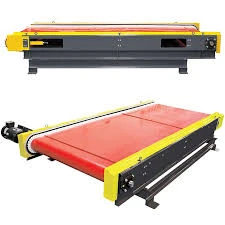

تشرینی دووەم . 04, 2024 11:21 Back to list
The Importance of Steel Shredder Machines in Recycling
In today's world, where environmental sustainability has become a pressing concern, the recycling industry plays a crucial role in managing waste and preserving our planet's resources. Among the various recycling techniques employed, steel shredding has emerged as a significant method for processing scrap metal, particularly steel. At the heart of this operation lies the steel shredder machine, a powerful tool that breaks down metal into smaller, manageable pieces, facilitating further recycling and regeneration.
Steel shredder machines are designed to handle large volumes of scrap metal efficiently. They operate using a combination of powerful motors, rotating knives, and hydraulic systems to shred steel into tiny fragments. This process not only makes it easier to transport and store scrap metal but also increases the surface area of the material, enhancing the efficiency of subsequent recycling processes such as melting and refining.
One of the key advantages of using steel shredder machines is their ability to process a wide variety of materials. From obsolete cars and appliances to industrial waste and construction debris, these machines can handle diverse sources of scrap steel. They help in extracting valuable metals from waste products, reducing the amount of material that ends up in landfills and conserving natural resources. By turning scrap into reusable material, steel shredders significantly contribute to a circular economy, where waste is minimized, and resources are continuously reused.

Moreover, the operation of steel shredder machines is increasingly becoming technologically advanced. Modern shredders come equipped with sensors and automated controls that enhance safety and efficiency. For instance, many machines include features that monitor performance and adjust operational parameters in real-time to optimize output and reduce energy consumption. Such innovations not only improve productivity but also lower operational costs, making recycling processes more economically viable for businesses.
Another noteworthy aspect of steel shredder machines is their positive impact on the environment. By promoting the recycling of steel, these machines help reduce greenhouse gas emissions associated with the extraction and processing of virgin raw materials. Recycling steel consumes significantly less energy compared to producing new steel from iron ore, which translates to lower carbon emissions. Thus, investing in steel shredding technology is not just an economic decision but also an environmentally responsible choice.
In conclusion, steel shredder machines are a vital component of the recycling industry, providing an efficient solution for transforming scrap metal into valuable resources. Their ability to process various materials, coupled with technological advancements and environmental benefits, makes them indispensable in the pursuit of sustainability. As cities and industries continue to grapple with waste management challenges, the role of steel shredder machines will undoubtedly become even more critical in creating a cleaner, more sustainable future.
Latest news
Troubleshooting Common Eddy Separator Problems
NewsJul.04,2025
The Role of Metal Recycling Plants in Circular Economy
NewsJul.04,2025
The Impact of Recycling Line Pickers on Waste Management Costs
NewsJul.04,2025
Safety Features Every Metal Shredder Should Have
NewsJul.04,2025
How Industrial Shredders Improve Waste Management Systems
NewsJul.04,2025
How Cable Granulators Contribute to Sustainable Recycling
NewsJul.04,2025